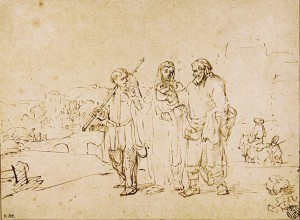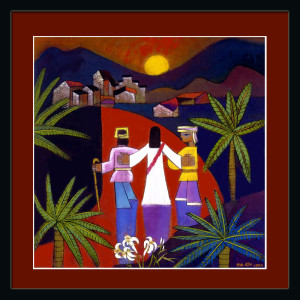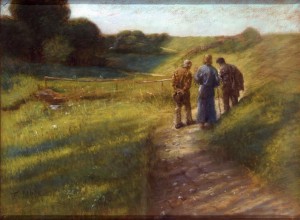a sermon on Acts 16:9-15
preached on May 1, 2016, at the First Presbyterian Church of Whitestone
Whenever I’m in an airport, I dream about the other places I might go if I could only just get on a flight at another gate. My ticket usually has some sort of average destination—most recently they’ve been places like Louisville, Nashville, or Jackson—but all too often I manage to end up one or two gates over from a flight to more glamorous spot or a place where I have good friends whom I haven’t seen in far too long. These dreams of alternative exciting destinations are almost impossible to fulfill, particularly by air, as I almost always must carefully plan my itinerary and destination, and I cannot even begin to imagine the additional cost of making such a chance on a whim!
It gets a little easier when traveling by car or on foot to make an unexpected extra stop at someplace that just looks interesting. For years and years, the trip between New York and Florida was well-marked by endless billboards that culminated in a giant sombrero at South of the Border, a roadside attraction in the midst of the swamplands of the Pee Dee River just south of the North Carolina border featuring gas stations, restaurants, an amusement park, a motel, and multiple stores that sell nearly everything you could ever imagine emblazoned with the “South of the Border” name and logo. I can’t imagine very many people who would put such a place on their formal itinerary, particularly one that is so very campy and even borderline offensive in its portrayal of Latino people and culture, but it is certainly a spot that is odd enough that it is difficult not to stop once! But even in this exceedingly mobile age, I suspect that most of us don’t have the luxury of stepping away from our carefully-planned itineraries to explore many new possibilities along the way.
Our reading this morning from Acts puts us in the midst of an unexpected journey that opened Paul and his companions to so many new things along the way. Paul had been making his way around modern-day Turkey with the goal of proclaiming the gospel there, but his attempts were thwarted at every turn, not by any human authority but because they had “been forbidden by the Holy Spirit to speak the word in Asia.” Forced to go in a different direction by “the Spirit of Jesus,” he and his party ended up at Troas, a port city on the Aegean Sea.
As they tried to sort out where to go next, Paul had a vision during the night. He saw a man of Macedonia,the Roman province of mainland Europe across the Aegean from Troas, standing there, and this man was pleading with Paul: “Come over to Macedonia and help us.” Trusting that this vision carried the wisdom and call of God, Paul and his party quickly turned from their intended destination of Asia Minor to the new possibilities across the Aegean Sea in Europe—a similar journey seen by so many refugees not so far from Troas who too seek a different path of life from Turkey across the Aegean to the island of Lesbos on Greek territory in Europe. Paul and his companions made several brief stops on their unexpected journey to Macedonia, but they ended up staying “for some days” in the city of Philippi as Paul’s missionary journeys turned to Europe for the first time as part of this unexpected journey.
As was his custom, in Philippi Paul first sought out faithful Jews who might be particularly receptive to his message about Jesus. So on the Sabbath, he and his party went to a place near a river outside the city gate where they expected people might be gathering for prayer, and they found a group of women gathered there who welcomed conversation with them.
One woman named Lydia was particularly interested in what Paul and his companions were sharing. She was “a worshiper of God,” likely not a Jew, perhaps intrigued by what she had heard before about God but perhaps not particularly interested in going through the process of becoming Jewish herself. She was a woman of substantial position in that time and place, a dealer in purple cloth who had made her way to Philippi from Asia Minor. As a businesswoman and merchant, Lydia had surely overcome great odds to build the networks she needed to do her work and run her own household—an unusual and incredible feat for a woman in that day and age!
Lydia’s interest in Paul’s message about Jesus quickly turned to deep engagement. She and her household were baptized, and then she invited Paul and his companions to stay in her home, extending incredible hospitality to these new companions on her journey of faithfulness and life. Paul and his party enjoyed Lydia’s support and presence throughout their stay in Philippi, even as Paul and Silas found themselves imprisoned there and were then freed from jail in one of the most memorable stories of the entire book of Acts. Lydia is remembered even now for her role in establishing this early church, and Paul remembered his days in Philippi with great fondness throughout his ministry, culminating in his most jubilant letter to them in the book of Philippians.
Paul’s trip to Philippi and encounter with Lydia are the sorts of stories that make it clear how meaningful unexpected journeys can be to us. We may not find stores filled with strange kitsch in the middle of a swamp like at South of the Border, the clarity of a vision to guide us along the way as Paul experienced in Troas, the wonderful possibility of a new continent and broader destination for our work as they found in Macedonia, or the gift of generous hospitality from those we meet along the way as Paul experienced with Lydia. But the unexpected—and maybe even expected—journeys of our lives can nonetheless be times of transformation and hope as we welcome the wonder of the Holy Spirit into our midst.
We need look no further than Paul’s journey to Macedonia and Philippi to give us a few ideas about how to be open to these possibilities in our lives. First, good conversation can open our lives to the new things of the Spirit. Just as Paul and his friends gathered with the group of women “outside the gate by the river” in Philippi, so we can sit with those we know and love—and those we would like to know and love more—to share good conversation and listen for God’s voice together. When we can’t get a direct word from God in the gift of a nighttime vision or a voice from the cloud, I have found that one of the clearest ways to hear the Spirit speaking is in conversation with one another, whether it be with a good friend over a simple meal, with a group of the committed faithful who struggle together with the implications of scripture or the experiences of common life, or even with a passing acquaintance who offers the presence of God at a time when we least expected it.
We can also experience God’s transformation and hope in the gift of shared service and faith with one another. Paul and Lydia connected in amazing and unexpected ways across boundaries of gender, culture, wealth, and place, and yet God spoke in and through their relationship to guide their lives of faith together. When we experience the gift of time together in faith and service, we are united to one another and to God in new ways that open us for deeper possibilities in the future. I am still inspired for my own service by the connections and possibilities that I experienced almost ten years ago as several of us from Whitestone joined a group of twenty Presbyterians from New York City in mission and recovery work on the Mississippi Gulf Coast after Hurricane Katrina. While I had met some of those on the trip before we traveled together, the work and experiences that we shared united us with one another and God in new ways that still inspire me nearly ten years later.
Finally, our unexpected journeys take their most powerful turn in the wonder and possibility of hospitality. In welcoming Paul and his party to her home, Lydia offered a powerful witness to the wonder of the gospel to break down barriers and bring people together. In the same way, when we offer God’s welcome to people in our life together in our homes, in our church, and beyond, we open ourselves to the gift of God’s presence in those in whom we might least expect it. And when we gather at the Lord’s table the welcome we have known from God with one another, we are lifted up into the presence of Christ himself, and we experience the power of hospitality as we share it with others and find it so broadly shared with us.
So may God open us to unexpected journeys, to places, times and ways that we will encounter the presence of the Holy Spirit in ways we would have never imagined, so that we might join God in the work of proclaiming the gospel of love and life in Jesus Christ our risen Lord. Thanks be to God! Amen.



